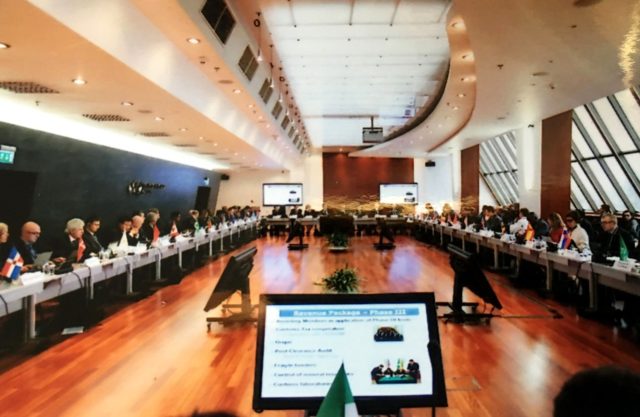The World Customs Organization (WCO) Policy Commission, held in Moscow, Russian Federation, from 5 to 7 December 2016 under the chairmanship of Mr. R. Davydov, brought to the fore the key role of Customs in creating a sustainable and efficient e-commerce ecosystem, reviving-up the exchange of data between stakeholders and enhancing risk-management through electronic interface. The other main topics discussed during the Commission pertained to trade facilitation, security, the enhancement of the Customs/Tax cooperation and the modernization of Customs administrations.
The newly established WCO Working Group on E-Commerce will work to tackle the different dimensions of e-commerce by collecting and exchanging best practices in the field, stocktaking and leveraging some of the ongoing work being carried out by other entities and drawing up proposals geared towards the development of practical solutions for the clearance of e-commerce shipments, including appropriate duty/tax collection mechanisms and control procedures.
Concerning the in-depth discussions on Custom /Tax cooperation, the WCO issued this year “Guidelines for strengthening cooperation and the exchange of information between Customs and Tax authorities at the national level” and will continue working on topics of common interest for Customs and Tax experts such as transfer pricing, drawback and Illicit Financial Flows (IFF).
During the Commission, WCO Secretary General Kunio Mikuriya, confirmed the WCO Theme for 2017 “Data Analysis for Effective Border Management” and stressed the impact of the digital revolution and the need to address promptly the challenges posed to the global economy. The Secretary General invited all the WCO Members to promote and share information in the coming months on how they are leveraging the potential of data to advance and achieve their objectives and respond to the expectations of traders, transport and logistic operators, and governments.
As data analysis will be emphasized in 2017 as a force multiplier for Customs administrations, it is relevant to highlight that the WCO is carrying out a Study to collect best practices among its members to assess and promote initiatives in the area of e-commerce. A previous analysis of preliminary data underscored the need for digitalization of processes, better sharing of information between e-commerce stakeholders and customs for improved risk management and the necessity for harmonization in the low-value shipment processes. – WCO









